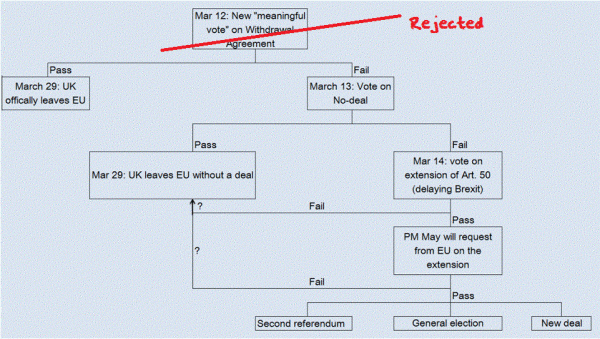The UK parliament again defeated, by 149 votes, the Withdrawal Agreement that PM Theresa May secured from the EU parliament. Despite the changes, attorney general Geoffrey Cox suggested the UK still would risk struck in the Irish backstop indefinitely. His opinion has raised concerns of both Brexit hardliners and some in the Bremain camp, leaving to the second defeat. There will be two more votes on Wednesday and Thursday. After all, the chances of extension of Article 50 and a second referendum have greatly increased.
What’s the difference between the revised deal and the first one?
On Monday, May announced that she secured “legally binding” changes in the deal regarding Irish border issues. First, a “joint legally binding instrument” was included, allowing the UK to start a “formal dispute” against the EU if it tried to keep the UK tied into the backstop indefinitely. Second, there was a UK-EU “joint statement” added to the political declaration, pledging to replace the backstop with alternative arrangements by December 2020. Third, the UK released a “unilateral declaration”, outlining the UK’s position that it would choose to leave the backstop arrangement if negotiations with the EU on future relationships break down. Yet, Cox suggested that these changes still carried a “legal risk” that the UK would not be able to leave the backstop arrangement if the EU does not agree.
What Next?
PM May would table a motion, asking if the MPs support to leave the EU without a deal on March 29. This is to get explicit consensus from the parliament as PM May affirmed that the UK “will only leave without a deal … if there is explicit consent in the House for that outcome”. It is almost certain that the motion would be defeated. This would be followed by Thursday’s vote on Extension of Art. 50 (delaying the time to officially leave the EU from Mar 29, 2019). It appears that the majority of MPs would prefer the extension. The key here is “for how long?”. It is believed that PM May favored a short extension. Meanwhile, Labors also revealed their preference for a short delay of about 3 months. This seems to be in contradiction with the party’s stance of supporting a second referendum, which probably needs at least a year of extension. Another critical factor is the European parliament election schedule in May. A short extension suggests that the UK would not participate in the elections. This would prevent the UK from legally extending its EU membership beyond June.

